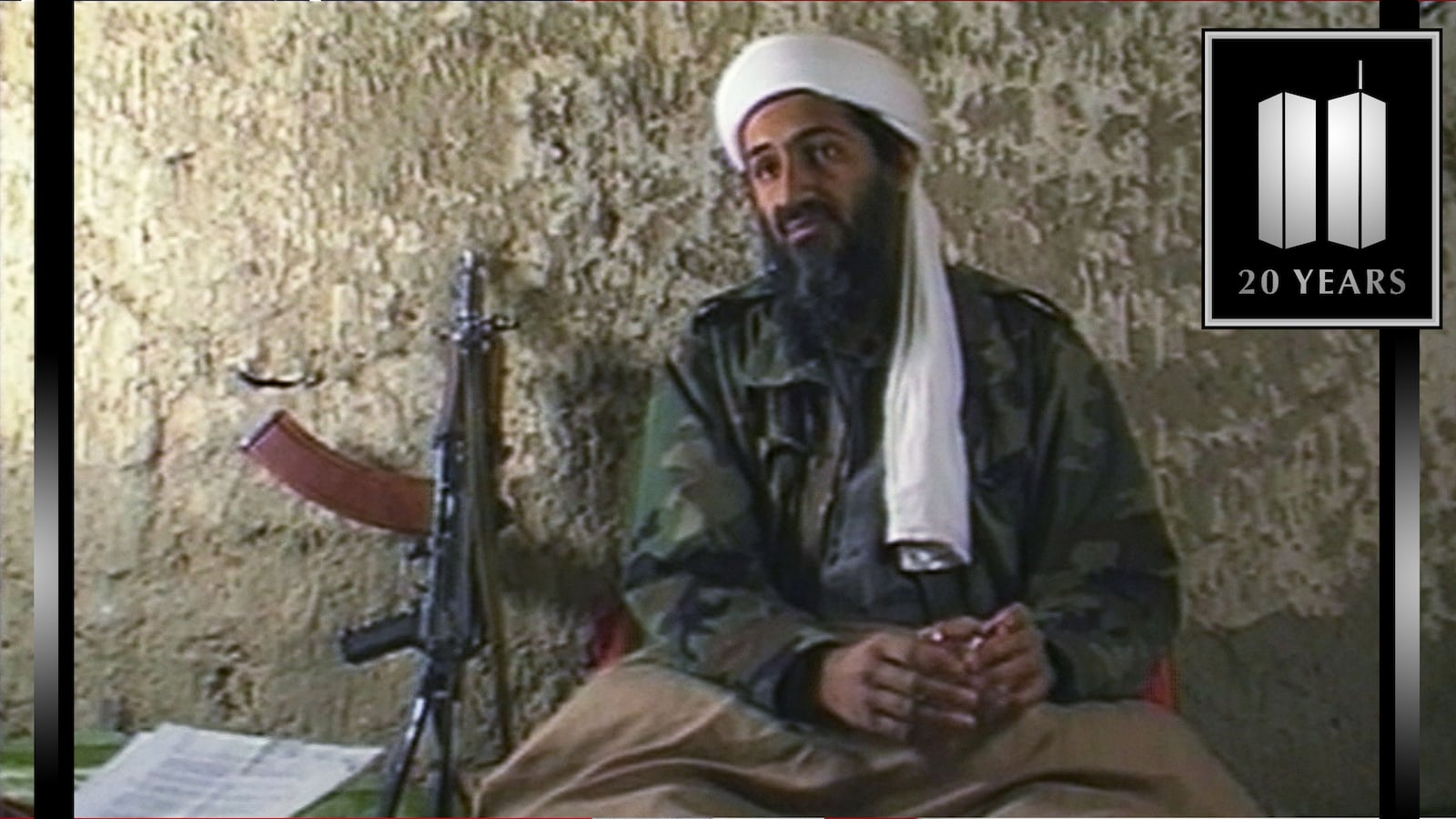After 20 years, who won the War on Terror?
In a 2004 speech sent to al-Jazeera, Osama bin Laden said that “all that we have to do is send two mujahideen to the furthest point east to raise a piece of cloth that says al-Qaeda, in order to make generals race there to cause America to suffer human, economic and political losses without their achieving anything of note.”
If bin Laden were alive today—and not a decaying, bullet-riddled corpse somewhere in the North Arabian Sea—he might crack a smug smile upon witnessing the United States end its disastrous war in Afghanistan with a chaotic and humiliating withdrawal.
Although bin Laden thankfully failed to achieve most of his initial goals with the 9/11 terror attacks, he unfortunately succeeded in weakening the world’s most formidable superpower by baiting it into wounding itself.
Afghanistan remains a testament to how bin Laden and a small group of fanatical, violent extremists left a bloody, enduring footprint on global politics. The 1979 invasion of Afghanistan by the Soviet Union was the radicalizing “shock and awe” moment for bin Laden and his generation of violent extremists, transforming the privileged scion of one of Saudi Arabia’s wealthiest families into the leader of a terrorist organization responsible for the worst terror attack on US soil. It bears reminding that in the 1980s, some of these men were mujahideen supported and praised as “freedom fighters” by the Reagan administration for fighting the godless, Communist Soviet threat.
In addition to being a training and recruitment ground for future violent terrorists, Afghanistan at the time also provided bin Laden a valuable lesson that he later used against the United States. “We, alongside the mujahideen, bled Russia for 10 years, until it went bankrupt,” bin Laden bragged in 2004. He knew he couldn’t defeat a superpower through traditional warfare; however, he could bleed them by unleashing a “war of a thousand cuts.” It would be a long, ugly war of attrition, in which a super power, with its hubris and its ginormous war machine, would overcommit its time and resources and eventually be entangled and stuck in a quagmire with rising costs, casualties, and dissension back at home.
It’s important to remember that the 9/11 terror attacks that claimed 3,000 lives were committed by 19 foreign hijackers, 15 of whom were from Saudi Arabia, two from the UAE, one from Lebanon and one from Egypt. None were from Iraq or Afghanistan. After the terror attacks, Ann Coulter wrote that the United States had to “invade [Muslim] countries, kill their leaders and convert them to Christianity.” So, naturally, the U.S. spent trillions of dollars fighting two disastrous wars in Iraq and Afghanistan. We eventually found bin Laden hiding in a compound with his family in another Muslim-majority country, Pakistan, nearly a decade after the initial terror attacks. Democracy did not bloom across the region, Muslims didn’t convert to Christianity, and nobody welcomed U.S. troops as "liberators." Instead, the war effort further engendered anti-Americanism and violent extremism across the region.
“So the war went ahead, the death toll rose, the American economy bled, and Bush became embroiled in the swamps of Iraq that threaten his future,” bin Laden reflected in 2004. Fast-forward 17 years and not only did that happen in Iraq, including a precipitous withdrawal that led to the rise of ISIS there and in Syria, but America’s $2 trillion and 20-year investment in propping up an Afghan civil government and army of 300,000 soldiers was wiped away in 11 days.
While Biden should be praised for renouncing his hawkish ways and committing himself to withdrawal, the manner in which it was done was an utter disaster for the Afghan people. As U.S. ally President Ashraf Ghani and his family fled to safety on a plane, thousands of Afghans, including interpreters and contractors who risked their lives to help U.S. forces, were trying desperately to flee the country, seeking protection at the Kabul airport, even trying to jump on a moving jumbo jet to escape. Meanwhile, the Taliban are still systematically hunting for collaborators and seeking to punish and kill them for helping the U.S.
Like Saigon, Kabul has become another cautionary tale of American hubris, mission creep, jingoistic propaganda, and racism that resulted in a needless, bloody, protracted war that eventually forced the world’s greatest superpower to retreat, humbled by a rag-tag, under-resourced but utterly committed army.
Daily Beast contributing editor Spencer Ackerman, author of the recently released Reign of Terror: How the 9/11 Era Destabilized America and Produced Trump, nonetheless pushes back on the idea that bin Laden actually won. “One of the pitiful ironies of the War on Terror is that more than one side lost,” he told me. Although he agrees that bin Laden “succeeded at prompting the U.S. to pursue a total disaster,” Ackerman concludes “he didn’t achieve any of his real goals.”
Ackerman relates how bin Laden’s goals with the 9/11 terror attacks were to rally Muslims around the world against U.S. imperialism, first forcing U.S. retrenchment from the Middle East, followed by a toppling of corrupt and corpulent U.S.-backed regimes in the Middle East. Not only did this not happen, but Ackerman says now “the U.S. has an expanded presence in the Arab world relative to its position on 9/11.” Also, importantly, Ackerman says “bin Laden lost control of his revolution.” Al Qaeda was eventually displaced in relevance by ISIS, which Ackerman says “didn’t give a shit about bin Laden’s fight-the-US-in-order-to-topple-the apostate-regimes strategy.”
I agree with Ackerman that bin Laden failed to achieve these specific goals, including landing his “decisive blow” against the U.S. that would force it to completely withdraw from Muslim-majority countries. However, journalist Ahmed Rashid, author of Taliban and Descent Into Chaos, told me that “bin Laden certainly harmed America. I mean 3,000 people died [on 9//11]...that’s going to be with us for many generations to come. It increased the whole idea of universal and local jihad around the world. He’s had an enormous impact.”
The attacks were intended by bin Laden to “break the fear of this false god and destroy the myth of American invincibility.” As the U.S. retreats from Afghanistan, it is clearly ceding ground not just to the Taliban, but also China and Russia who still have their embassies and will normalize diplomatic relations with the Taliban to secure their interests and regional presence in Central Asia. The legacy of the war in Afghanistan includes trillions of dollars wasted, thousands of lives lost, dead U.S. soldiers, a weakened economy, increased debt, a diminishment of America’s role on the international stage, a continued betrayal of our promises to our allies—as evidenced by Afghans left behind—and our unreliability as good-faith partners, also reflected in Trump’s withdrawal from the U.S.-Iran deal.
Another disastrous part of America’s response to 9/11 was fearmongering against Muslims and immigrants, which served as fuel for white supremacist conspiracy theories and the rise of Donald Trump who exploited the confusion and hate to rile up white voters. It should come as no surprise that ISIS and other violent Muslim extremists were actively rooting for the man who was running on a Muslim ban during the 2016 election.
Globally, Rashid says the Taliban returning to power in Afghanistan will “absolutely embolden violent jihadists around the world, especially in Pakistan. There’s no doubt about it.” If the Taliban tell these extremists to return to their home country, “this will increase problems throughout the entire region.”
It seems the only winners of this disastrous war were the original architects. Global defense contractors from the military-industrial complex reaped immense profits. No members of the Bush administration went to jail for their role in orchestrating and cheerleading the unnecessary and criminal “War on Terror,” instead, nearly all of them failed up. President George W Bush is now often seen as an eccentric painter who gives candy to Michelle Obama. The Taliban, flush with opium money, waited 20 years and retook control of Afghanistan with greater diplomatic support and relations with international allies.
The world is now a battlefield. Twenty years after the 9/11 terror attacks, America is more internally divided than ever before, with some members of the GOP actively acting as proxies for white supremacist groups. In order to “liberate” Afghanistan, an estimated 75,000 Afghan military and police officers, along with over 71,000 Afghan civilians, gave their lives. They are joined by more than 3,500 coalition soldiers and nearly 21,000 US soldiers who were injured. “As we turn the page on the foreign policy that has guided our nation the last two decade, we’ve got to learn from our mistakes,” Biden said in his address about the end of our longest war. The same week, a U.S. missile killed 10 people, including seven children, in retaliation for the ISIS-K attack on the Kabul airport.
Innocent civilians are continuing to pay the price for American mistakes. Same as it ever was.



